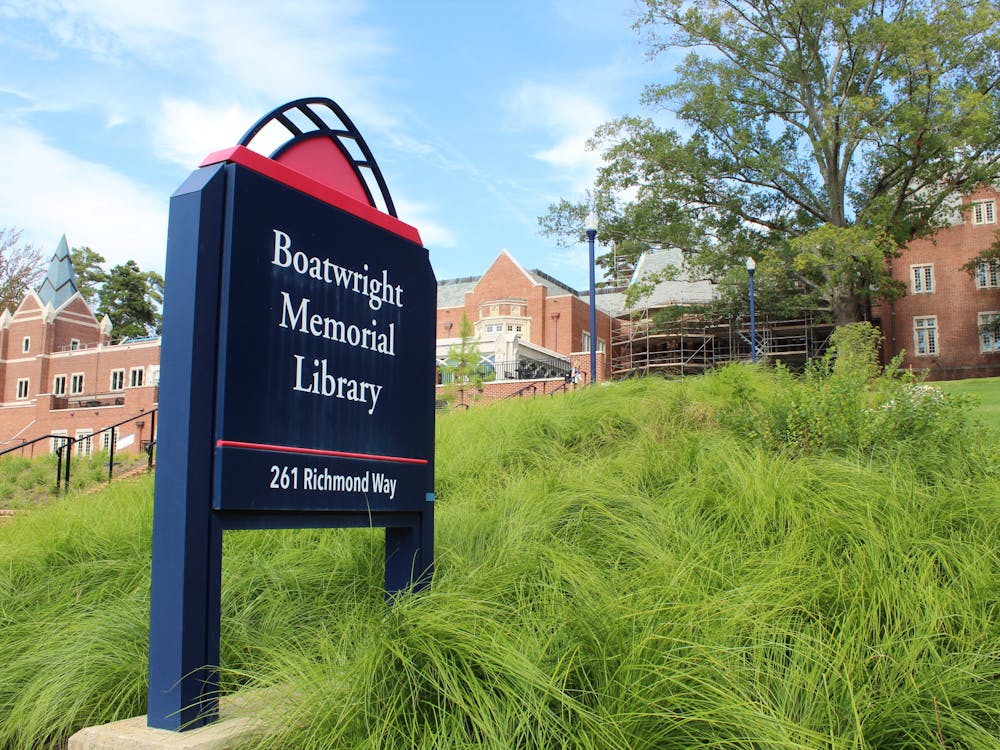At first glance, the website for the Digital Scholarship Lab looks unaffiliated with the University of Richmond. There is no Richmond crest, no red or blue color scheme and no sign of a spider.
However, tucked away in the basement of the Boatwright Memorial Library, the members of the DSL are researching new methods to answer old questions regarding digital humanities at Richmond and beyond, said Robert Nelson, the DSL's director.
The DSL experiments with modern techniques in order to better analyze data primarily from 19th century America, Nelson said. "Mining the Dispatch," one of the DSL's current projects, identifies, quantifies and categorizes the most popular topics in the Richmond Daily Dispatch during the Civil War, Nelson said.
According to the DSL website, the evidence from the Richmond Daily Dispatch spans from Lincoln's election in 1860 through the evacuation of Richmond in 1865 -- at which point the Daily Dispatch ceased to exist -- to months later when the publication resumed.
The lab uses a top modeling technique that is able to uncover patterns in data, Nelson said. After splitting the search into 40 topics that would have dominated the news during that time, the members of the DSL can make certain inferences from how many times each category is referenced in the paper, he said.
Aside from independent research projects, the DSL also collaborates with other departments at the university.
Suzanne Jones, professor and department chairwoman of the English department, said she had first approached the DSL while preparing to teach a First Year Seminar on Americans in Paris, she said.
Jones said she had wanted students to be able to pinpoint where certain famous Americans (artists, writers, painters, etc.) had worked and lived in Paris on a digital map. After meeting with humanities consultant Kenneth Warren at the Center for Teaching Learning and Technology, Jones was referred to the DSL for assistance, she said.
The DSL, with the help of Google Earth, was able to create an interactive map which, with the click of a mouse, pinpoints on the map morph into the present-day locations of where influential Americans in Paris once lived, Jones said.
"I envisioned what I would love for students to do, but I never expected we would ever be able to do anything like that," Jones said. "It was just a wonderful experience."
Laura Browder, a professor of American Studies, worked with the DSL on a grant application to build an education website about women in combat.
"It also illuminates history in a way that traditional scholarship simply can't," Browder said. "It's as though we all breathe and live digital media all day long. The DSL shows us a way to take the environment we swim in to use as a tool to understand history in a new way."
Enjoy what you're reading?
Signup for our newsletter
Nelson said the brainchild of the DSL was President Ed Ayers who has been working with digital humanities since 1991. Soon after Nelson invited Ayers to give a talk on digital humanities at the College of William and Mary in 2007, Ayers approached Nelson about working in the DSL, he said.
Scott Nesbit, the DSL's associate director, joined the DSL after completing a doctoral fellowship at the Institute for Advanced Studies in Culture at the University of Virginia. Nesbit said Ayers had been his graduate adviser.
Nathan Altice, the DSL's web designer, works with faculty and students by using new technology to create historical teaching aids in the classroom. Altice worked alongside Jones during the "Americans in Paris" project through the Tocqueville Seminar program, a University of Richmond project funded by the Andrew W. Mellon Foundation.
Nathaniel Ayers, son of President Ayers, is a program analyst in the DSL. After graduating from VCU in 2006 with a degree in kinetic imaging, Ayers began working in the DSL soon after, he said.
Megan Molnar, a history and political science major, has been interning for the DSL for the last academic year. "The rewards of working in the DSL have been huge," Molnar said. "It is because of the DSL that I have discovered my love for research."
President Ayers, the creator of the DSL at Richmond, said the digital humanities were for making things of immediate impact. "We're not just saying here's something to use for your teaching. We're reinventing scholarship."
Contact reporter Liz Monahan at liz.monahan@richmond.edu
Support independent student media
You can make a tax-deductible donation by clicking the button below, which takes you to our secure PayPal account. The page is set up to receive contributions in whatever amount you designate. We look forward to using the money we raise to further our mission of providing honest and accurate information to students, faculty, staff, alumni and others in the general public.
Donate Now



